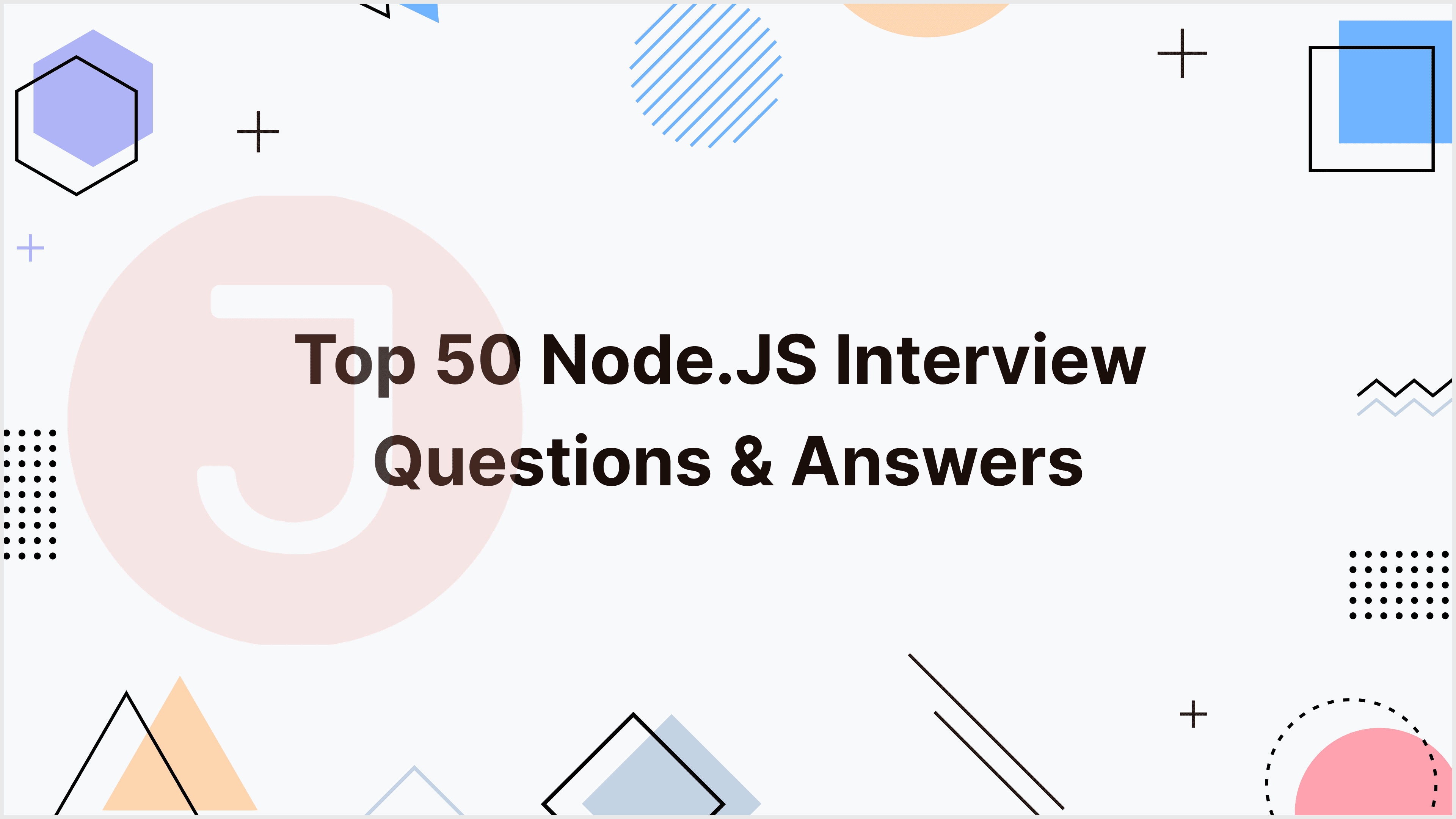Node.js stands as a popular server-side platform adopted by an increasing number of companies. If you’re gearing up for a career change and have an upcoming interview, it’s advisable to prepare ahead and refine your interview skills. While there exist some questions typical of all interview types, it’s equally beneficial to enhance your readiness by concentrating on questions specific to your particular industry.
We’ve compiled a comprehensive list of prevalent Node.js interview questions that frequently arise during interviews, along with the most effective methods to respond to them. This resource will also aid in your comprehension of the fundamental concepts of Node.js.
Table of Contents
- 1 Interview Questions
- 1.1 1. What is Node.js?
- 1.2 2. How does Node.js differ from JavaScript running in a web browser?
- 1.3 3. What is an event-driven architecture in Node.js?
- 1.4 4. Explain the term “Callback” in Node.js.
- 1.5 5. What is the purpose of the Node Package Manager (NPM)?
- 1.6 6. How do you create a simple HTTP server in Node.js?
- 1.7 7. Explain the difference between require and import in Node.js.
- 1.8 8. What is the purpose of the global object in Node.js?
- 1.9 9. How do you handle exceptions in Node.js?
- 1.10 10. Explain the role of the EventEmitter class in Node.js.
- 1.11 11. What is the Event Loop in Node.js, and how does it work?
- 1.12 12. Describe the purpose of the Buffer class in Node.js.
- 1.13 13. What is a module in Node.js?
- 1.14 14. How can you pass command-line arguments to a Node.js application?
- 1.15 15. Explain what a Promise is in Node.js.
- 1.16 16. What is the purpose of the fs module in Node.js?
- 1.17 17. How do you prevent callback hell or the “Pyramid of Doom” in Node.js?
- 1.18 18. Describe what middleware is in the context of Express.js.
- 1.19 19. What is the purpose of the module.exports object in Node.js?
- 1.20 20. Explain what CORS is and how it can be handled in a Node.js application.
- 1.21 21. What is the purpose of the Cluster module in Node.js?
- 1.22 22. How do you handle environment variables in Node.js?
- 1.23 23. What is the purpose of the os module in Node.js?
- 1.24 24. How does Node.js handle concurrency and parallelism?
- 1.25 25. What are the core modules in Node.js, and how are they different from external modules?
- 1.26 26. How can you debug a Node.js application?
- 1.27 27. Explain what a callback function is and provide an example of its use.
- 1.28 28. What is the purpose of the url module in Node.js?
- 1.29 29. How does the “require cache” work in Node.js?
- 1.30 30. What is the purpose of the http module in Node.js?
- 1.31 31. Explain the role of the crypto module in Node.js.
- 1.32 32. What is the difference between the “callback pattern” and “Promises” for handling asynchronous operations?
- 1.33 33. How do you manage sessions in a Node.js application?
- 1.34 34. Explain the concept of “streaming” in Node.js.
- 1.35 35. How can you improve the performance of a Node.js application?
- 1.36 36. What are child processes in Node.js, and when would you use them?
- 1.37 37. Explain what WebSockets are and how they differ from HTTP.
- 1.38 38. How does error handling differ in synchronous and asynchronous code in Node.js?
- 1.39 39. What is the purpose of the util module in Node.js?
- 1.40 40. Explain what a “module loader” is in Node.js.
- 1.41 41. What are the differences between the setTimeout and setInterval functions in Node.js?
- 1.42 42. What is the “event-driven” nature of Node.js and why is it beneficial?
- 1.43 43. Explain how you can handle authentication in a Node.js application.
- 1.44 44. How do you serve static files in an Express.js application?
- 1.45 45. What is the purpose of the http.ServerResponse object in Node.js?
- 1.46 46. How can you improve the security of a Node.js application?
- 1.47 47. What is the purpose of the cluster module in Node.js, and how can it improve performance?
- 1.48 48. What is the purpose of the dns module in Node.js?
- 1.49 49. Explain the concept of “middleware” in the context of Express.js, and provide an example of its use.
- 1.50 50. How does Node.js handle multiple requests concurrently without threads?
- 2 Conclusion
- 3 FAQ
Interview Questions
1. What is Node.js?
Answer: Node.js is an open-source JavaScript runtime environment that allows you to execute JavaScript code on the server-side.
2. How does Node.js differ from JavaScript running in a web browser?
Answer: Node.js runs JavaScript on the server, whereas browsers execute JavaScript in a client’s browser.
3. What is an event-driven architecture in Node.js?
Answer: Node.js uses an event-driven, non-blocking I/O model, where operations are performed asynchronously.
4. Explain the term “Callback” in Node.js.
Answer: A callback is a function passed as an argument to another function to be executed after a specific event or operation.
5. What is the purpose of the Node Package Manager (NPM)?
Answer: NPM is used to manage packages and dependencies in Node.js applications.
6. How do you create a simple HTTP server in Node.js?
Answer: You can create an HTTP server using the built-in http module.
7. Explain the difference between require and import in Node.js.
Answer: require is the CommonJS way of importing modules, while import is an ES6 feature supported in Node.js through Babel or by using the "type": "module" flag in package.json.
8. What is the purpose of the global object in Node.js?
Answer: The global object in Node.js represents the global scope and can be used to store global variables.
9. How do you handle exceptions in Node.js?
Answer: You can use try...catch blocks to handle exceptions in Node.js.
10. Explain the role of the EventEmitter class in Node.js.
Answer: The EventEmitter class allows you to create and handle custom events in Node.js.
11. What is the Event Loop in Node.js, and how does it work?
Answer: The Event Loop is a fundamental part of Node.js, responsible for handling asynchronous operations, I/O, and callbacks.
12. Describe the purpose of the Buffer class in Node.js.
Answer: The Buffer class is used for handling binary data in Node.js, especially when working with streams and network protocols.
13. What is a module in Node.js?
Answer: A module is a reusable piece of code encapsulated in a file, which can be loaded using require.
14. How can you pass command-line arguments to a Node.js application?
Answer: You can access command-line arguments using the process.argv array.
15. Explain what a Promise is in Node.js.
Answer: A Promise is a way to handle asynchronous operations, representing a future value or error.
16. What is the purpose of the fs module in Node.js?
Answer: The fs module is used for file system operations, such as reading and writing files.
17. How do you prevent callback hell or the “Pyramid of Doom” in Node.js?
Answer: Use techniques like named functions, Promises, or async/await to flatten callback chains.
18. Describe what middleware is in the context of Express.js.
Answer: Middleware functions are functions that have access to the request and response objects and can perform tasks like authentication, logging, and more in an Express.js application.
19. What is the purpose of the module.exports object in Node.js?
Answer: module.exports is used to expose functions, objects, or variables from a module to other parts of the application.
20. Explain what CORS is and how it can be handled in a Node.js application.
Answer: CORS (Cross-Origin Resource Sharing) is a security feature that controls which domains can access resources. You can handle it in Node.js using the cors middleware.
21. What is the purpose of the Cluster module in Node.js?
Answer: The Cluster module is used to create multiple child processes to take advantage of multi-core systems.
22. How do you handle environment variables in Node.js?
Answer: You can use the process.env object to access environment variables in Node.js.
23. What is the purpose of the os module in Node.js?
Answer: The os module provides information about the operating system, such as CPU, memory, and network interfaces.
24. How does Node.js handle concurrency and parallelism?
Answer: Node.js uses an event loop for concurrency but can achieve parallelism by using child processes or worker threads.
25. What are the core modules in Node.js, and how are they different from external modules?
Answer: Core modules are built-in, while external modules need to be installed via NPM. Core modules include http, fs, os, and more.
26. How can you debug a Node.js application?
Answer: You can use the built-in debugger, console.log, or external tools like Visual Studio Code’s debugger.
27. Explain what a callback function is and provide an example of its use.
Answer: A callback function is a function passed as an argument to another function and is executed when an operation is complete. For example, in an HTTP request, you can use a callback to handle the response.
28. What is the purpose of the url module in Node.js?
Answer: The url module is used for parsing and formatting URL strings.
29. How does the “require cache” work in Node.js?
Answer: Node.js caches modules once required, so subsequent require calls for the same module use the cached version.
30. What is the purpose of the http module in Node.js?
Answer: The http module is used for building HTTP servers and making HTTP requests.
31. Explain the role of the crypto module in Node.js.
Answer: The crypto module provides cryptographic functionality, such as encryption, hashing, and creating secure random data.
32. What is the difference between the “callback pattern” and “Promises” for handling asynchronous operations?
Answer: Callbacks use a more nested structure, leading to callback hell, while Promises provide a more structured and readable way to handle asynchronous operations.
33. How do you manage sessions in a Node.js application?
Answer: You can use external packages like express-session for managing sessions in Express.js.
34. Explain the concept of “streaming” in Node.js.
Answer: Streaming is a way to process and transfer data in small, manageable chunks rather than loading it all into memory at once.
35. How can you improve the performance of a Node.js application?
Answer: Performance can be improved by optimizing code, using proper design patterns, minimizing I/O, and utilizing caching.
36. What are child processes in Node.js, and when would you use them?
Answer: Child processes are separate processes spawned from the main Node.js process, used to perform tasks concurrently or leverage multi-core systems.
37. Explain what WebSockets are and how they differ from HTTP.
Answer: WebSockets allow two-way, full-duplex communication between a client and server, while HTTP is request-response based.
38. How does error handling differ in synchronous and asynchronous code in Node.js?
Answer: In synchronous code, errors can be caught with try…catch. In asynchronous code, errors are typically handled with callbacks, Promises, or try…catch within the event loop.
39. What is the purpose of the util module in Node.js?
Answer: The util module provides utility functions for working with JavaScript objects.
40. Explain what a “module loader” is in Node.js.
Answer: A module loader is a component that manages the loading, caching, and execution of modules in a Node.js application.
41. What are the differences between the setTimeout and setInterval functions in Node.js?
Answer: setTimeout executes a function once after a specified delay, while setInterval repeatedly executes a function at a defined interval.
42. What is the “event-driven” nature of Node.js and why is it beneficial?
Answer: Node.js is event-driven, which means it can handle multiple concurrent connections efficiently without blocking the event loop, leading to high performance.
43. Explain how you can handle authentication in a Node.js application.
Answer: You can use various strategies like JWT (JSON Web Tokens), Passport.js, or OAuth for handling authentication in Node.js applications.
44. How do you serve static files in an Express.js application?
Answer: You can use the express.static middleware to serve static files like HTML, CSS, and JavaScript.
45. What is the purpose of the http.ServerResponse object in Node.js?
Answer: The http.ServerResponse object is used to send HTTP responses to clients in Node.js.
46. How can you improve the security of a Node.js application?
Answer: Security improvements include input validation, avoiding callback hell, using secure authentication methods, and keeping dependencies up to date.
47. What is the purpose of the cluster module in Node.js, and how can it improve performance?
Answer: The cluster module allows a Node.js application to utilize multiple CPU cores by creating multiple child processes.
48. What is the purpose of the dns module in Node.js?
Answer: The dns module is used for DNS (Domain Name System) resolution in Node.js, such as looking up IP addresses for domain names.
49. Explain the concept of “middleware” in the context of Express.js, and provide an example of its use.
Answer: Middleware is a function that can intercept and process requests in an Express.js application. An example is a middleware function to log requests.
50. How does Node.js handle multiple requests concurrently without threads?
Answer: Node.js employs a single-threaded event loop, non-blocking I/O, and asynchronous callbacks to handle multiple requests efficiently, eliminating the necessity for multiple threads.
Conclusion
Keep in mind that these questions serve as a starting point. The nature of interview questions may vary depending on the position you’re applying for and the required expertise level. Be ready to delve further into particular subjects and offer comprehensive explanations during your Node.js interview.
FAQ
Node.js is popular for its event-driven, non-blocking I/O model, allowing for scalable and high-performance server-side applications.
npm (Node Package Manager) is the package manager for Node.js. It is used to install, manage, and share packages or libraries, making it easy to include external modules in a Node.js project.
The event loop is a core concept in Node.js that continuously checks the message queue for tasks to execute. It ensures non-blocking operations by handling events asynchronously.
module.exports object in Node.js? module.exports is used to define the public API of a Node.js module. It allows you to expose functions, objects, or variables for use in other parts of the application.
Node.js is designed to handle concurrent requests efficiently due to its non-blocking nature. You can further scale by using techniques like clustering, load balancing, and implementing a microservices architecture.




